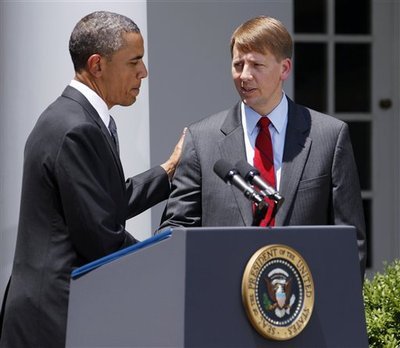Citing the deliberative process privilege, SDNY Judge Rakoff thwarted the New York Times’ attempt to obtain a copy of Department of Justice Office of Legal Counsel’s

legal memoranda allegedly supporting President Obama’s January 2012 recess appointment of Richard Cordray as Director of the Consumer Financial Protection Bureau (CFPB).
In its opinion, available at this link, Judge Rakoff ruled that the Times failed to prove that White House Press Secretary Jay Carney’s remarks or the temporal connection of the Cordray appointment (January 4) and the OLC memo (January 6) constituted presidential approval sufficient to warrant waiver of the deliberative process privilege. New York Times Co. v. U.S. Dep’t of Justice, 2013 WL 174222 (S.D.N.Y. Jan. 7, 2013).
Recess Appointment
On January 4, 2012, while the U.S. Senate was in recess, President Obama appointed Richard Cordray as CFPB Director. The Constitution permits recess appointments, but presidents traditionally do not make appointments during a recess lasting less than 10 days. During the Senate’s December-January winter break, it held so-called “pro forma” sessions to prevent the recess from officially lasting more than three days. The Cordray appointment created legal and political controversy because it came during a period when the Senate was not formally in recess.
The OLC sought to quell the controversy by publishing a legal memorandum authored by Virginia Seitz, OLC Ass’t Attorney General. In the memo, available here, Seitz argued that the Senate’s pro forma sessions could not prevent the President’s constitutional authority to make appointments during a Senate recess. The memo cited two prior OLC memos, authored by Jack L. Goldsmith and John P. Elwood, as precedent.
NYT FOIA Request
The Times filed suit to enforce its FOIA request for access to the Goldsmith and Elwood memoranda. The DOJ countered that Exemption 5 protected the memoranda from disclosure because the deliberative process privilege, attorney-client privilege, and presidential communications privilege covered their contents. The Times conceded that deliberative process privilege covered the memoranda but argued that the DOJ had waived the privilege.
Privilege Issues
The Court correctly stated that the government may waive the deliberative process privilege in two situations. First, the so-called “working law” waiver applies when the governmental document is more properly categorized as stating or interpreting the agency’s law and policies rather than as a document containing predecisional agency deliberations. Second, the adoption or incorporation waiver provides that a document containing predecisional deliberations loses its privileged status when the governmental agency adopts its contents as policy.
The Times argued that President Obama adopted the OLC memo–thus waiving the privilege–when he made the January 4, 2012 Cordray recess appointment. For proof, the Times argued that the chronology between the OLC memo and the appointment proved the president’s adoption. President Obama made the January 4 recess appointment following meetings with OLC attorneys. Then, on January 6, 2012, the OLC sent the White House the Seitz memorandum memorializing its verbal recommendations.
The Times also argued that White House Press Secretary Jay Carney’s comments in his January 12, 2012 press briefing proved the President’s adoption. A reporter questioned whether the President made the recess appointment without OLC approval because the appointment was made on January 4, 2012 and the Seitz memo was finalized on January 6, 2012.
In response, Mr. Carney stated that the President made the decision following receipt of a verbal opinion and that it was common for OLC memos memorializing verbal opinions to take some time to prepare. This video clip from the January 12, 2012 White House Press Briefing shows Mr. Carney’s remarks regarding the OLC memo.
Ruling
The Court ruled that chronology alone did not prove that the president adopted the reasoning of the Seitz memo–and certainly not the reasoning set forth in the Goldsmith and Elwood memoranda. Moreover, the Court noted that Mr. Carney’s remarks did not show that the President adopted the reasoning of the Goldsmith and Elwood memoranda.
To show adoption waiver of the deliberative process privilege, the party seeking the information must show that the decisionmaker–here the President–relied on the document’s analysis and conclusions. A decisionmaker can rely on a document’s conclusions without agreeing with the underlying reasoning. If a decisionmaker reviews an agency recommendation and makes a “yes or no” determination without providing reasoning for the decision, then a court may not infer that she adopted the agency’s reasoning.
Here, Judge Rakoff ruled that the Times produced no evidence that President Obama expressly adopted the reasoning of the Goldsmith and Elwood memoranda in making the Cordray recess appointment. And without this evidence, the deliberative process privilege remained intact to protect the memoranda from public disclosure.
Another Victory for Obama Administration
The New York Times decision, issued on January 7, 2013, marks the second deliberative process privilege victory for the Obama Administration in the span of five days.
On January 2, 2013, the SDNY Judge Colleen McMahon ruled that the deliberative process privilege protected from FOIA disclosure legal memoranda allegedly supporting the administration’s use of drones to unilaterally kill suspected terrorists, including American citizens. The decision, explained in an earlier POP post, similarly held that the administration had not waived the deliberative process privilege through comments made by President Obama and Attorney General Holder. Consequently, the Obama Administration, in a matter of days, successfully protected from public disclosure the legal bases for its drone program decision and recess decision.

1 Comment
Comments are closed.